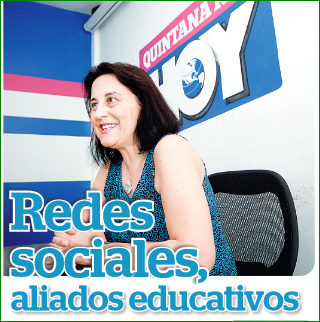

Fuente: Periódico Quintana Roo Hoy
The ECO project is presenting and represented in various MOOC and educational conferences, not just in Europe but throughout the world.
ECO project coordinator Sara Osuna travelled to the CIP conference in May in Cancún 2016 to present the status on the 17 ECO Learning MOOCs as well as the progress made on the first MOOCs designed and run by the programmes own eTeachers. ECO learning is on a path of growth towards an expending democratic form of education, where both learning and teaching anytime, anywhere needs to be top of mind.
“The idea is to drive the enrichment of ubiquitous learning and pull down the classroom walls in education, proving that people are capable of learning anywhere”, Sara Osuna says in an interview with Quinta Roo Hoy, a media platform covering the CIP Conference, II Cumbre Iberamericano de Periodismo, which took place between 12 and 15th of May in Cancún, Mexico. Theme of the conference was Channels, journalism and development, the power of internet in Latin America (Medios, periodismo y desarrollo, el poder de internet en América Latina).
Osuna commented during the interview and at the conference on the results ECO Learning project so far: 17 MOOC courses, 100% free, the ECO course portfolio encompassing content from humanities topics to languages, robotics and creativity, in no less than 6 different languages. 50.000 Registered participants so far.
The interview can be read here in Spanish.
In addition she expressed her content with not only these numbers and facts, but moreover the proof that through these Massive Online Open Coomunication modules, education can be accessed and enjoyed by anyone, regardless of the time or place. Anyone interested needs just an email address and internet connection, register and choose the or more courses as they like, free of charge. In that sense the MOOC portfolio is giving everyone the opportunity to develop, learn, close any skills gap they feel they to close for better job opportunity or for the purpose of personal growth.
In other words: we are getting one step closer to eductional democracy.


